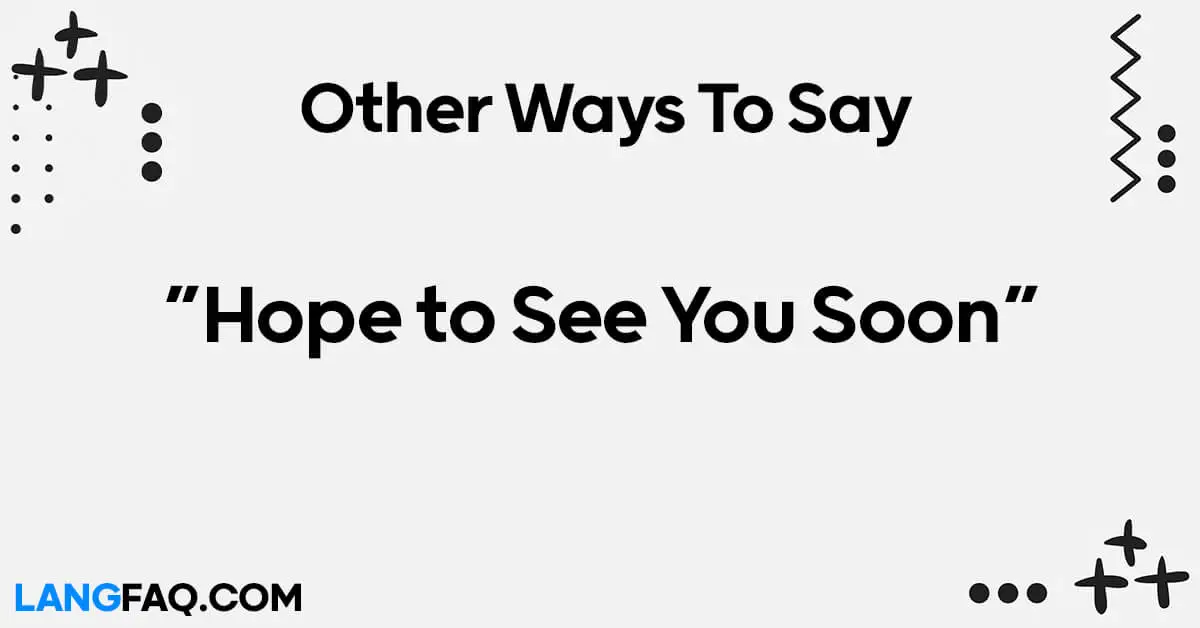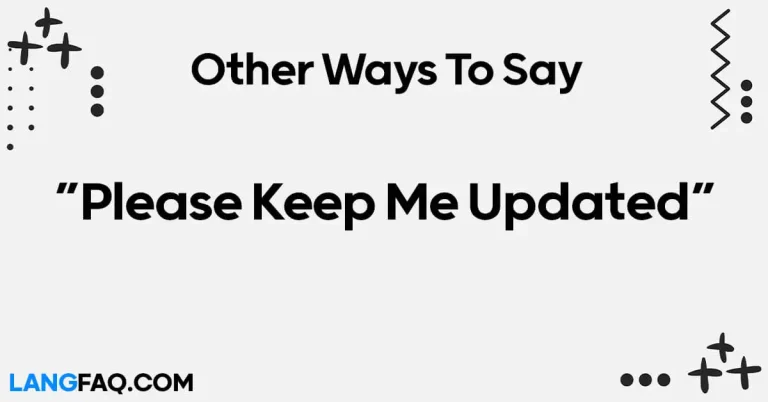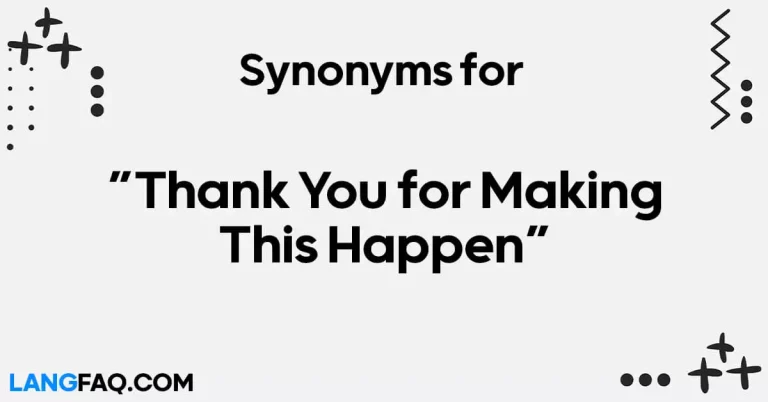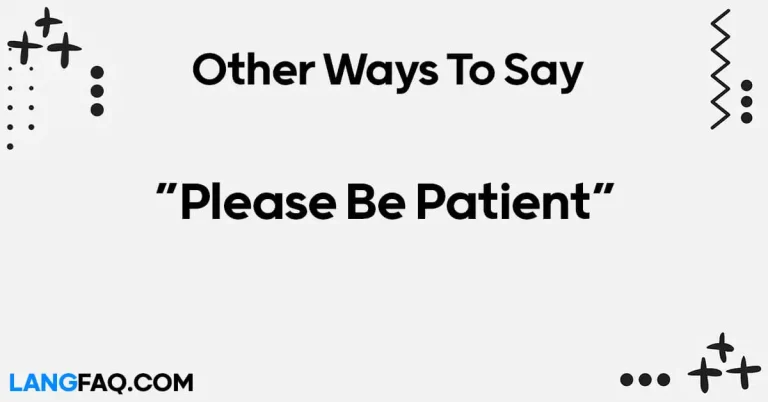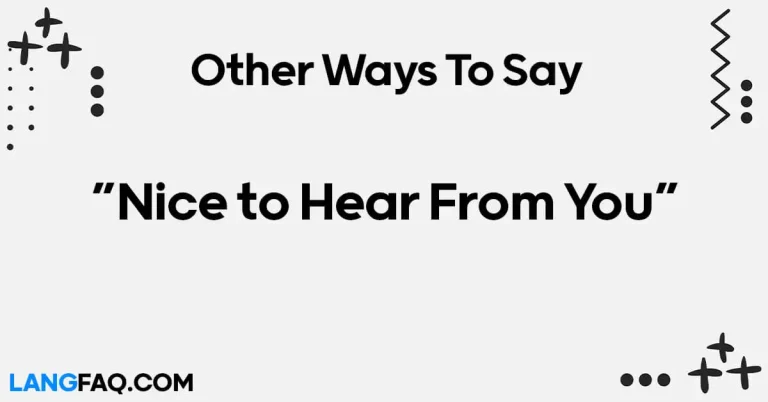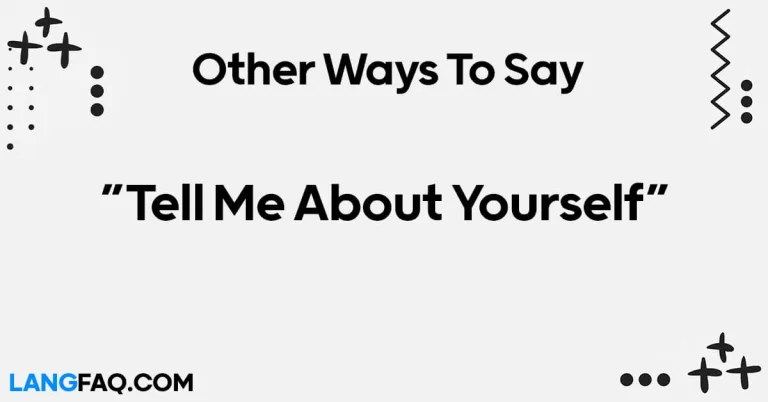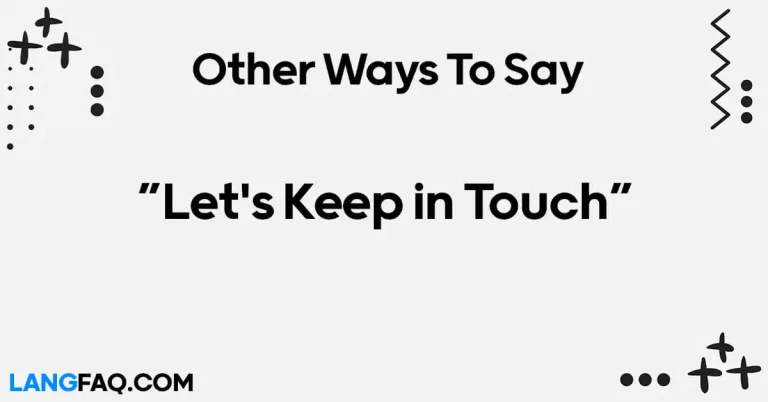Welcoming someone or bidding them farewell is an art, and the phrase “Hope to See You Soon” is a timeless classic. However, language is dynamic, and diversity in expression adds charm to our conversations. In this article, we explore 12 other captivating ways to convey the sentiment of anticipating a future meeting. Master the nuances of farewell with these engaging alternatives that enrich your vocabulary and leave a lasting impression.
12 Other Ways to Say “Hope to See You Soon”
Here are 12 other ways to express “Hope to See You Soon”:
- Anticipating Our Next Encounter
- Looking Forward to Our Reunion
- Until Our Paths Cross Again
- Wishing for a Swift Reconnection
- Eagerly Awaiting Our Next Meeting
- Hoping for a Speedy Return
- In Expectation of Our Future Get-Together
- Counting Down to Our Next Rendezvous
- Yearning for Another Meet-Up
- Longing for the Pleasure of Your Company Again
- Anxiously Awaiting Our Next Interaction
- In High Hopes of Seeing You Again Soon
Here’s a table with meanings and examples for the 12 alternative expressions:
| Expression | Meaning | Example Sentence |
|---|---|---|
| Anticipating Our Next Encounter | Expressing excitement for a future meeting | “I’m eagerly anticipating our next encounter.” |
| Looking Forward to Our Reunion | Anticipating a joyful meeting in the future | “I’m looking forward to our reunion next week.” |
| Until Our Paths Cross Again | Hoping for a future meeting | “Until our paths cross again, take care.” |
| Wishing for a Swift Reconnection | Desire for a quick and meaningful reunion | “Wishing for a swift reconnection with you soon.” |
| Eagerly Awaiting Our Next Meeting | Expressing eagerness for the next encounter | “I’m eagerly awaiting our next meeting together.” |
| Hoping for a Speedy Return | Desire for a prompt return | “Hoping for a speedy return, stay safe on your journey.” |
| In Expectation of Our Future Get-Together | Anticipating a future gathering | “In expectation of our future get-together, plan well.” |
| Counting Down to Our Next Rendezvous | Expressing excitement with a countdown | “Counting down to our next rendezvous, can’t wait!” |
| Yearning for Another Meet-Up | Expressing a strong desire for another meet | “Yearning for another meet-up, let’s plan it soon.” |
| Longing for the Pleasure of Your Company Again | Expressing a heartfelt desire for reunion | “Longing for the pleasure of your company again, miss you.” |
| Anxiously Awaiting Our Next Interaction | Expressing anticipation with a hint of anxiety | “Anxiously awaiting our next interaction, it’s been too long.” |
| In High Hopes of Seeing You Again Soon | Optimistically expecting a soon reunion | “In high hopes of seeing you again soon, take care!” |
These 12 alternatives provide a diverse range of expressions to convey the sentiment of anticipating future meetings. Whether it’s a formal setting or a casual encounter, these phrases offer a nuanced way to express your eagerness and optimism for the next rendezvous.
Is It Correct to Say “Hope to See You Soon”?
Certainly, the expression “Hope to See You Soon” is correct and widely used in various contexts. It is a polite and friendly way to convey the desire for future meetings or reunions. This phrase is commonly used in both formal and informal settings, making it versatile for professional relationships, social encounters, and personal connections.
Usage in Different Contexts:
- Professional Setting:
- Example: “Thank you for the meeting. Hope to see you soon to discuss the project further.”
- Email Sample: “Appreciate your time today. Hope to see you soon in our upcoming team sessions.”
- Social Gatherings:
- Example: “Great hanging out with you. Hope to see you soon for another movie night.”
- Message Sample: “Had a fantastic time. Hope to see you soon for coffee and catch-up!”
- Personal Relationships:
- Example: “Take care. Hope to see you soon; we should plan a weekend getaway!”
- Text Sample: “Miss you already. Hope to see you soon for a family dinner.”
Pros of Using “Hope to See You Soon”:
- Politeness: The phrase is courteous and expresses a positive outlook.
- Versatility: It suits various relationships and settings.
- Familiarity: Widely accepted and understood in English-speaking cultures.
Cons:
- Commonality: Its widespread use might make it seem generic in certain situations.
- Formality: Might be considered less formal in very professional contexts.
Tips for Using “Hope to See You Soon”:
- Appropriateness: Assess the relationship and setting to ensure the phrase fits.
- Variation: Occasionally use alternative expressions for a more personalized touch.
- Timing: Use it when there is a genuine possibility of a future encounter.
Professional Mail Example With “Hope to See You Soon”
Subject: Appreciation for the Collaborative Meeting
Dear [Recipient’s Name],
I trust this message finds you well. I would like to express my sincere gratitude for the insightful meeting we had earlier today. Your contributions and expertise significantly enriched our discussions.
The collaborative spirit displayed during our session is truly commendable, and I am confident that our collective efforts will lead to successful outcomes. Your valuable insights have provided a clear direction for the next steps in our project.
I appreciate your commitment to excellence and your dedication to our shared goals. It is truly a pleasure working with someone of your caliber.
As we wrap up today’s meeting, I look forward to our continued collaboration. The progress we’ve made today sets the stage for future achievements. Your professionalism and expertise contribute immensely to the success of our endeavors.
Thank you once again for your time and commitment. Hope to see you soon in our upcoming team sessions, where we can delve deeper into the project details.
Best regards,
[Your Full Name] [Your Position] [Your Company] [Contact Information]
Anticipating Our Next Encounter
Anticipation adds a touch of excitement to farewells, and the phrase “Anticipating Our Next Encounter” elegantly captures this sentiment. Whether in a professional or personal setting, using this phrase signals optimism and sets the stage for a joyful reunion.
When to Use:
- Formal Context (Colleagues or Business): Before parting ways in a professional environment, expressing anticipation adds a positive note. For instance, in an email sign-off: “Anticipating our next encounter in the boardroom, looking forward to collaborating further.”
- Informal Context (Friends or Family): In more relaxed settings, this phrase conveys eagerness in a friendly manner. For example, in a casual text message: “Anticipating our next encounter over coffee, it’s been too long!”
Example Sentence:
“In anticipation of our next encounter, I wanted to express my gratitude for the insightful conversation we had today.”
Email Sample:
Subject: Looking Forward to Our Future Collaboration
Dear [Recipient’s Name],
I trust this message finds you well. I wanted to express my appreciation for our recent meeting. Anticipating our next encounter, I look forward to the prospect of further collaboration and shared successes.
Best regards, [Your Full Name]
Looking Forward to Our Reunion
The phrase “Looking Forward to Our Reunion” carries a sense of joyful anticipation, making it ideal for expressing enthusiasm for an upcoming meeting. Whether used in a professional email or a heartfelt note to a friend, it adds a personal touch to your farewell.
When to Use:
- Formal Context (Professional Setting): Ending a business email with this phrase conveys professionalism and positive anticipation. For instance, “Looking forward to our reunion in the upcoming project meeting.”
- Informal Context (Friends or Family): In more personal settings, this phrase creates a warm and friendly tone. For example, “Looking forward to our reunion at the family gathering next weekend!”
Example Sentence:
“As we bid farewell for now, I find myself looking forward to our reunion with great excitement.”
Email Sample:
Subject: Exciting Times Ahead
Dear [Recipient’s Name],
It was a pleasure working with you on the recent project. Looking forward to our reunion in the next team meeting. Your insights are truly valued, and I can’t wait for our continued collaboration.
Warm regards, [Your Full Name]
Until Our Paths Cross Again
“Until Our Paths Cross Again” is a timeless phrase that combines warmth with a sense of inevitability. It’s a versatile expression suitable for both formal and informal farewells, emphasizing the expectation of a future meeting.
When to Use:
- Formal Context (Colleagues or Professional Acquaintances): This phrase is fitting for concluding a business meeting or email. For example, “Thank you for the productive discussion. Until our paths cross again in the next quarterly review.”
- Informal Context (Friends or Acquaintances): In personal relationships, this phrase adds a heartfelt touch. For instance, “Take care, my friend. Until our paths cross again, stay well!”
Example Sentence:
“Farewells are not goodbyes but a ‘until our paths cross again,’ a reassurance of the inevitable reunions life offers.”
Email Sample:
Subject: Until Our Next Collaboration
Dear [Recipient’s Name],
It was a pleasure collaborating on the recent project. Your insights were invaluable. Until our paths cross again in our future endeavors. Looking forward to our continued partnership.
Best regards, [Your Full Name]
Wishing for a Swift Reconnection
“Wishing for a Swift Reconnection” combines well-wishing with the hope for a prompt return, making it a thoughtful and warm expression. It suits various contexts, from professional settings to personal relationships.
When to Use:
- Formal Context (Professional Networks): Use this phrase in emails or messages when expressing the hope for a quick and efficient reconnection. For instance, “Wishing for a swift reconnection for our follow-up discussion on the proposed project.”
- Informal Context (Friends or Family): In more personal settings, it communicates a genuine desire for a quick return. For example, “Take care during your travels. Wishing for a swift reconnection when you’re back!”
Example Sentence:
“In the realm of farewells, ‘wishing for a swift reconnection’ adds a touch of warmth, signaling not just a goodbye but a hopeful ‘see you soon.'”
Email Sample:
Subject: Safe Travels and Swift Reconnection
Dear [Recipient’s Name],
Safe travels on your upcoming journey. Wishing for a swift reconnection upon your return. Looking forward to hearing about your experiences.
Warm regards, [Your Full Name]
Eagerly Awaiting Our Next Meeting
“Eagerly Awaiting Our Next Meeting” brings a level of excitement to farewells, expressing genuine eagerness for the next encounter. This phrase is adaptable to both formal and informal situations, making it a versatile choice.
When to Use:
- Formal Context (Professional Engagements): In professional settings, it conveys enthusiasm for future collaborations. For instance, “Thank you for today’s meeting. Eagerly awaiting our next meeting to delve deeper into the project details.”
- Informal Context (Friends or Close Associates): In personal relationships, this phrase adds a personal touch. For example, “Great catching up with you. Eagerly awaiting our next meeting, perhaps over lunch?”
Example Sentence:
“As we part ways today, know that I am eagerly awaiting our next meeting, where our paths converge once more.”
Email Sample:
Subject: Excitement for Our Future Interactions
Dear [Recipient’s Name],
Our recent conversation left me inspired. Eagerly awaiting our next meeting to explore further possibilities. Until then, take care.
Best regards, [Your Full Name]
Hoping for a Speedy Return
Expressing the desire for a swift return, “Hoping for a Speedy Return” adds sincerity to farewells. This phrase is suitable for various contexts, from professional emails to personal messages.
When to Use:
- Formal Context (Professional Relationships): In business communications, it conveys a professional yet warm farewell. For instance, “Safe travels. Hoping for a speedy return to continue our discussions in the next meeting.”
- Informal Context (Friends or Family): In personal settings, it communicates genuine concern and anticipation. For example, “Take care on your trip. Hoping for a speedy return; we miss your presence!”
Example Sentence:
“Farewells are softened by the phrase ‘hoping for a speedy return,’ a wish that transcends the moment and looks forward to the joy of reunion.”
Email Sample:
Subject: Safe Travels and Hopes for Your Quick Return
Dear [Recipient’s Name],
Wishing you safe travels on your journey. Hoping for a speedy return, and looking forward to reconnecting soon.
Warm regards, [Your Full Name]
In Expectation of Our Future Get-Together
“In Expectation of Our Future Get-Together” combines formality with anticipation, making it suitable for both professional and personal settings. This phrase adds a touch of sophistication to your farewells, setting the tone for a planned and awaited meeting.
When to Use:
- Formal Context (Professional Connections): Conclude business emails with this phrase for a polished farewell. For example, “Thank you for today’s discussion. In expectation of our future get-together to finalize the project details.”
- Informal Context (Friends or Acquaintances): Use it to express anticipation in a refined manner. For instance, “Great spending time with you. In expectation of our future get-together, let’s plan something special!”
Example Sentence:
“Parting ways today, let it be known that I am in expectation of our future get-together, where camaraderie will once again take center stage.”
Email Sample:
Subject: Excitement for Our Upcoming Gathering
Dear [Recipient’s Name],
Our recent meeting was productive. In expectation of our future get-together, I look forward to discussing our shared projects further.
Best regards, [Your Full Name]
Counting Down to Our Next Rendezvous
“Counting Down to Our Next Rendezvous” injects a sense of excitement and urgency into farewells, making it suitable for various contexts. This phrase works well in both professional and personal farewells.
When to Use:
- Formal Context (Business or Professional Engagements): In professional settings, it adds a touch of excitement to your sign-off. For instance, “Thank you for today’s meeting. Counting down to our next rendezvous for deeper collaboration.”
- Informal Context (Friends or Close Associates): Use it to convey anticipation in a friendly manner. For example, “Great hanging out with you. Counting down to our next rendezvous, maybe for a movie night?”
Example Sentence:
“Farewells become a countdown to joy with the phrase ‘counting down to our next rendezvous,’ turning the ordinary into an eagerly awaited moment.”
Email Sample:
Subject: Anticipation for Our Next Collaboration
Dear [Recipient’s Name],
Our recent collaboration was insightful. Counting down to our next rendezvous for more brainstorming sessions. Exciting times ahead!
Warm regards, [Your Full Name]
Yearning for Another Meet-Up
“Yearning for Another Meet-Up” expresses a deep and heartfelt desire for future meetings. This emotionally charged phrase is versatile, suitable for both formal and informal farewells, leaving a lasting impression.
When to Use:
- Formal Context (Professional Relationships): In business communications, it conveys genuine enthusiasm for future collaborations. For example, “Appreciate our discussion today. Yearning for another meet-up to explore innovative solutions.”
- Informal Context (Friends or Family): In personal settings, it adds an emotional touch to your farewell. For instance, “Goodbye for now. Yearning for another meet-up soon, perhaps for a weekend getaway?”
Example Sentence:
“Farewells gain a poignant touch with the phrase ‘yearning for another meet-up,’ conveying a genuine desire for the joy of shared moments in the future.”
Email Sample:
Subject: Excitement for Our Ongoing Partnership
Dear [Recipient’s Name],
Our collaboration has been inspiring. Yearning for another meet-up to delve deeper into our ongoing partnership. Looking forward to future successes.
Best regards, [Your Full Name]
Longing for the Pleasure of Your Company Again
“Longing for the Pleasure of Your Company Again” elevates farewells to a more formal and refined level. This phrase is suitable for professional and personal contexts, emphasizing the desire for future collaboration.
When to Use:
- Formal Context (Business or Professional Engagements): In professional settings, it conveys a sense of respect and anticipation. For example, “Thank you for your time. Longing for the pleasure of your company again in our future endeavors.”
- Informal Context (Close Friends or Acquaintances): In personal relationships, it communicates genuine warmth. For instance, “Great catching up. Longing for the pleasure of your company again; let’s plan something soon!”
Example Sentence:
“Farewells become a gracious invitation with the phrase ‘longing for the pleasure of your company again,’ expressing a genuine appreciation for shared moments.”
Email Sample:
Subject: Anticipating Our Continued Collaboration
Dear [Recipient’s Name],
Our recent collaboration was insightful. Longing for the pleasure of your company again in our ongoing projects. Exciting times ahead!
Warm regards, [Your Full Name]
Anxiously Awaiting Our Next Interaction
“Anxiously Awaiting Our Next Interaction” adds a touch of excitement and eagerness to farewells, suitable for both professional and personal contexts. This phrase communicates a sense of urgency and anticipation for the next meeting.
When to Use:
- Formal Context (Professional Relationships): In business communications, it conveys dedication and enthusiasm. For example, “Thank you for the insightful discussion. Anxiously awaiting our next interaction to finalize the project details.”
- Informal Context (Friends or Close Associates): In personal relationships, it brings an element of excitement. For instance, “Take care, my friend. Anxiously awaiting our next interaction, perhaps for a weekend outing?”
Example Sentence:
“As we bid farewell today, let it be known that I am anxiously awaiting our next interaction, where ideas will flow and connections will deepen.”
Email Sample:
Subject: Excitement for Our Future Collaborations
Dear [Recipient’s Name],
Our recent collaboration was energizing. Anxiously awaiting our next interaction to delve deeper into our shared projects. Looking forward to continued success.
Best regards, [Your Full Name]
In High Hopes of Seeing You Again Soon
“In High Hopes of Seeing You Again Soon” expresses optimism and eagerness for future meetings. This versatile phrase works well in both professional and personal farewells, leaving a positive and lasting impression.
When to Use:
- Formal Context (Business or Professional Engagements): In professional settings, it conveys a positive outlook. For example, “Thank you for today’s meeting. In high hopes of seeing you again soon for further collaboration.”
- Informal Context (Friends or Family): In personal relationships, it adds a friendly touch. For instance, “Goodbye for now. In high hopes of seeing you again soon, maybe for a casual get-together?”
Example Sentence:
“Farewells become a beacon of optimism with the phrase ‘in high hopes of seeing you again soon,’ a testament to the positive expectations for future encounters.”
Email Sample:
Subject: Optimism for Our Upcoming Connections
Dear [Recipient’s Name],
Our recent interactions have been enriching. In high hopes of seeing you again soon to continue our collaborations. Exciting times ahead!
Warm regards, [Your Full Name]
FAQs:
What is the most formal way to express hope for a future meeting? The most formal expression is “In Anticipation of Our Next Meeting.” It exudes professionalism while conveying eagerness.
Is “Until We Meet Again” too traditional? No, “Until We Meet Again” carries timeless charm and is suitable for various settings, making it a versatile choice.
How does “In Hopes of Our Paths Crossing Again” differ from other phrases? This phrase introduces an element of serendipity, highlighting the unpredictable yet delightful nature of future encounters.
Can “Eagerly Awaiting Our Next Rendezvous” be used in a business context? Certainly. This phrase adds a touch of sophistication, making it suitable for professional settings.
Why choose “Wishing for a Swift Reunion” over other options? This phrase combines warm wishes with a genuine desire for a speedy return, making farewells more heartfelt.
What is the significance of expressing anticipation in farewells? Expressing anticipation adds positivity and depth to farewells, making them more memorable and uplifting.
Conclusion:
Parting ways can be bittersweet, but the way we express it can transform the experience. These 12 alternatives to “Hope to See You Soon” offer a palette of expressions, allowing you to tailor your farewells to various situations. Whether it’s a formal setting or a casual gathering, these phrases enrich your communication skills, leaving a positive and lasting impression.

